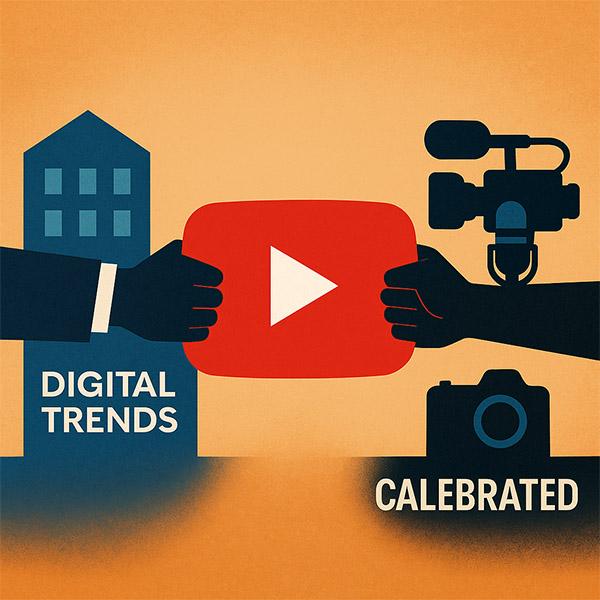Digital Trends vs. Caleb Denison: How a Friendly Send-Off Turned Into a Copyright Showdown

Enter CalebRated
On April 21 Denison flipped the switch on CalebRated, a YouTube channel positioned as a direct continuation of his TV-centric tech coverage. Two videos—one on 2025’s best OLED sets, another on budget streaming gear—went live, and the channel rocketed past 32k subscribers in its first 72 hours.
A surprise copyright strike
The party lasted less than a week. Late on April 27 YouTube yanked the two videos after Digital Trends Media Group filed DMCA takedown notices, claiming it owns the content—or at least the intellectual property that underpins it. The move stunned viewers who had just celebrated Denison’s independence and puzzled industry insiders who’d read DT’s earlier “we wish Caleb the best” farewell post.
Digital Trends’ side of the story
According to an internal source quoted by eCoustics, DT maintains that Denison:
• Signed an IP-assignment and non-solicitation agreement prior to leaving;
• Registered the “CalebRated” channel in February while still on payroll;
• May have approached advertisers and shot footage with company gear before his exit.
DT says it would “prefer to work out a deal” rather than litigate, but the company’s first move was the nuclear DMCA option—effectively freezing Denison’s new venture until the dispute is resolved.
Denison’s response
Denison has called the allegations “not rooted in fact” and is otherwise keeping his powder dry. A GoFundMe—started by former DT producer Rich Shibley—has begun raising legal funds. In a community post still visible on the dormant channel, Denison thanked supporters and teased “new ways to get content to you while we sort this out.”
What the law actually says
YouTube’s DMCA process is blunt: a takedown is immediate, the accused creator has 10 business days to file a counter-notice, and the claimant then has 14 days to haul the matter into federal court or the videos go back up. In practice, most disputes settle before reaching a judge because the legal tab climbs faster than subscriber counts.
Digital Trends’ strongest card would be evidence that the scripts, graphics, or even the channel name were conceived or produced on company time or equipment. Denison’s likely defense: the work was created after he left or falls outside any “work-for-hire” scope. Equipment use is a weaker claim (journalists take notebooks with them all the time), but it’s often thrown in for leverage.
Why this matters beyond one channel
Talent-driven media brands are a double-edged sword. Publishers love the authenticity and audience loyalty a recognizable host brings—until that host walks out the door. The Denison case could test how far a publisher can extend IP claims over personality-driven coverage that isn’t a scripted drama but a tech review anyone could, in theory, replicate.
Where things stand
Channel status: CalebRated remains live but video-less; it shows ~32.5 k subscribers and a recent Roku-related community post.
Legal clock: Denison’s counter-notice window closes early next week; DT then has a two-week decision point.
Negotiations: Both sides say they’d prefer settlement, but neither has blinked publicly.
What to watch next
Counter-notice filed? That’ll signal Denison is ready for a court fight—or at least to call DT’s bluff.
Quick re-brand. A fresh channel name could neuter DT’s trademark angle and let Denison restart content flow.
Platform hedging. Twitch, TikTok, and Instagram Reels don’t halt uploads during DMCA disputes; Denison may diversify to keep sponsor interest warm.
Precedent. However this resolves, other publishers and on-air talent will cite it when negotiating future contracts—and exits.
For viewers, the immediate upshot is simple: if you want Denison’s buying advice, you’ll have to wait—or catch him guest-hosting elsewhere—until the legal dust settles. For the rest of us in tech media, his fight with Digital Trends is a cautionary tale: talent is portable, but intellectual property provisions travel too, and they don’t care how many subs you have.


























































People I feel sympathy for in this situation: Caleb, who worked hard for a company for many years and was the most known face of their media outlet. Neutral employees at Digital Trends who will likely need to find new employers soon due to DT torpedoing their own brand.
People I feel absolutely no sympathy for: Anyone at Digital Trends, be it in-house counsel or upper management that thought this was a good idea. Look, you didn't come up with the idea of reviewing A/V gear, having users submit questions and a person from your company provide answers, etc. You are one of a number of websites/YouTube channels that provide such services. If the natural course had been CalebRated takes off and DigitalTrends saw a loss of views/visitors/subscribers then it would have been an indication of the quality of your work. Instead you're going to be viewed as a petty company and have people like me unsubscribe from your YouTube channel.
I had remained willing to continue to give DT a chance until I came across this article. I know Sound & Vision is just reporting the events, and I sincerely doubt S&V reported this to get people like me riled up, but I'm tired of companies trying to bully their way into being successful.
I wish nothing for the best for the people at S&V, Caleb, and all the talent at DT that held no part in this travesty.